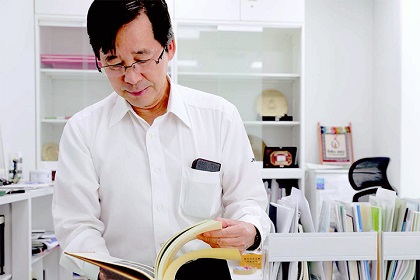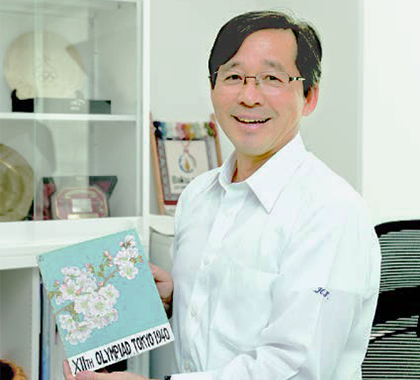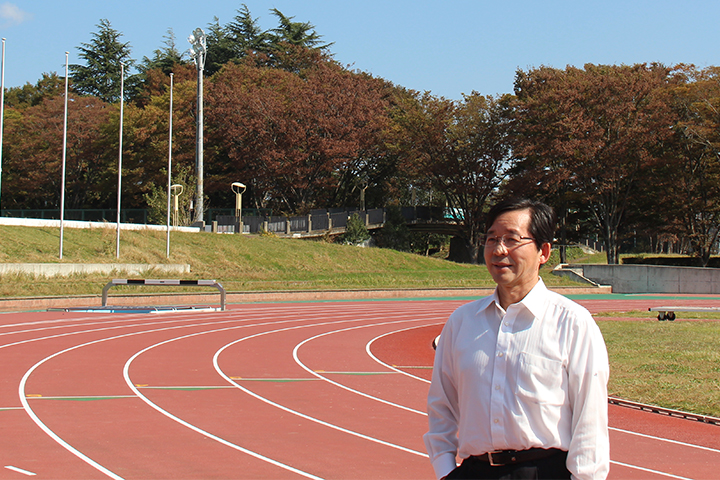TSUKUBA FRONTIER
#024 From Ancient Greece to Tokyo: What Have the Japanese People Sought from the Olympics?
Professor SANADA Hisashi, Faculty of Health and Sport Sciences

The Olympic and Paralympic Games are a special event not only for top athletes but for the host city, host country, and spectators everywhere. Prof. Sanada offers a historical perspective on how the ancient Olympics, originally a ceremony of religious significance, was revived in modern Europe as a festival of sports and culture, and what factors encouraged Japan to so actively accept Olympic culture.
■ The Olympics and JapanAlthough there are many international sports competitions, the Olympic Games are considered special, an event that athletes dream of competing in, and that captures the attention of people across the world. Part of what makes the Olympics so special is the panoply of competitive events and the gathering of the world's top athletes for the competition.
The modern Olympics were introduced to Japan in 1909 by Jigoro Kano, the headmaster of the Tokyo Higher Normal School--the prewar predecessor to the University of Tsukuba. Kano became the first Asian member of the International Olympic Committee and was a leading spokesman for Japan's bid for the 1940 Olympic Games.
Unfortunately, this tournament was never to be, due to the outbreak of the Second World War. Including this event that never was, the keywords for the Olympics held in Japan have always been reconstruction and peace. For the Japanese people, the Olympics have fed recovery from war and natural disaster.
■ Athletics for a Nation

Kano is known as the founder of judo, but he also deserves huge credit for his achievements in promoting sports education in Japan.
As a boy, Kano was physically weak. He started taking jujitsu lessons to overcome the frustration of being bullied. Once he started studying martial arts, his short temper receded, and he gained a broader perspective on things. He set out to popularize jujitsu, codifying the techniques and rules and the physical art, which developed into a new competitive sport called judo. A concept from England that had become popular at the time in Japan was the principle of three types of education--intellectual, moral, and physical--with judo's combination of the three making it an ideal educational tool.
Kano's disciples spread judo overseas. The basis of judo is to use the opponent's power against them, hence the saying, "Softness controls hardness." Stories have it that foreigners were taken aback to see smaller Japanese people throwing their larger opponents one after another.
Physical education was a subject taught in schools in Japan, but it consisted primarily of calisthenics. Kano's innovation was to incorporate martial arts and Western sports to create a more comprehensive physical education. He also put energy into popularizing swimming and long-distance running as national athletics that everyone could do--regardless of age, sex, or athletic ability--and that didn't cost money.
■ Sports for Self-ImprovementJapan sent its first Olympic delegation of two athletes to the 1912 Stockholm Olympics. One was the marathon runner Shizo Kanakuri, a student at the Tokyo Higher Normal School, who came to the attention of his principal, Kano, during a long-distance race held at the school. Kanakuri began training in earnest, to the point where he set a marathon world record. At that time running shoes were not in common use, and the record he set was wearing tabi footwear that he had modified himself.
Kanakuri ran the Olympic marathon three times, but due to poor physical condition, improper pacing, or other reasons, he never completed one. Later on, reflecting on his experiences, he explained that there is no shame in training to the best of one's ability and being defeated.
Kanakuri is also known as the person who established the Hakone Ekiden, a relay race for university students. The course is dotted with famous historic spots, and it was Kanakuri's idea that runners could also learn about the area's geography and history as they ran. He himself ran in regions across the country and recommended that people take up long-distance running, a healthy lifelong pursuit that can be done at one's own pace even as a person ages. Setting a goal and running to achieve it creates a sense of accomplishment and raises a person's integrity, he felt. The idea that personal growth is more important than the result is in line with the teachings of Kano.
■ An Intangible Legacy for the Next Generation

In Japan's period of high economic growth starting in the mid-1950s, the message of reconstruction and peace translated into vast improvements in the country's transportation network, facilities, and other physical infrastructure. These remain as a legacy of the period, yet in the Japan of today, with its mature infrastructure and economy, a new legacy needs to be created--a non-physical legacy.
With that in mind, Olympic education is being carried out to lead up to the 2020 Tokyo Olympics. The Tsukuba International Academy for Sport Studies (TIAS) supervises and distributes teaching materials to schools to communicate the Olympic philosophy and ideal of fair play. Prof. Sanada is also involved in its efforts to cultivate volunteers.
One of the merits for the host country is that everyone can participate in the Olympic Games in some way. Creating shared memories through watching and cheering, and generating positive feelings of hope are also part of taking part in the Olympics. The good memories, passed on to the next generation, are an intangible legacy.
■ A Quick History of the 700th OlympiadOlympic history dates back to 776 BCE, when the first ancient Olympics were held, at which time every four-year period started to be counted as an "Olympiad". Different calendars were kept in ancient Greece by each polis (city-state), and the Olympic games were held to reset the calendar deviation.
When counted thus, the Tokyo Olympic and Paralympic Games in 2020 will be the 700th Olympiad. Prof. Sanada considers himself very fortunate that he is able to summarize Olympic in his own country, which will hold the event. But what remains a mystery is how the culture of the Olympic Games that was built in Europe became so enthusiastically accepted in Japan.
One of the reasons has to be the influence of Jigoro Kano. He added an educational perspective to sports--a struggle ending in victory or defeat--and presented diverse ways to engage with sports. As we approach the 700th Olympiad, Prof. Sanada's thoughts go to the source of Kano's passion, who dedicated his entire life to the spreading of physical education.

Professor Hisashi Sanada, Faculty of Health and Sport Sciences
Chairman of the Tsukuba International Academy for Sport Studies (TIAS). Has conducted historical research on the Olympics and practical research on Olympic education.
Director of the IOC-certified Centre for Olympic Research and Education (CORE) at the University of Tsukuba, Vice Chairman of the Japan Olympic Academy, member of the Culture and Education Commission under the Tokyo Organizing Committee of the Olympic and Paralympic Games. Prof. Sanada is also a sports history advisor for the 2019 NHK historical fiction ("taiga") drama series, Idaten.
Article by Science Communicator at the Office of Public Relations


